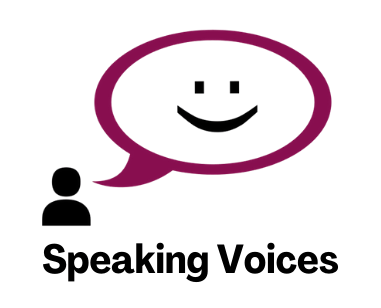My Journey to Finding My Voice
For years, I hid behind roles and personas, using acting as a way to avoid showing the real me. I told myself I was confident because I could play a character convincingly. But in reality, I was afraid to let people see who I truly was. I didn’t want my personal traumas affecting me living my everyday life, so I got rid of the bad parts of me I tried to be someone else rather than embracing my authentic self. Playing someone else felt safe, it allowed me to express emotions and ideas without fear of judgment. But outside of acting, I felt disconnected.
Whenever I had to speak as me, I felt exposed. I worried I was too young to be taken seriously, too inexperienced to share my thoughts. So, I stayed quiet.
It wasn’t until I started working on my voice, literally and figuratively, through my Master’s that I began to understand the importance of expressing myself. I realised that the same authenticity that made me a compelling actor could also make me a confident speaker. But it required me to stop hiding and start owning who I was.
I began to practise expressing myself, first in small ways, like sharing my opinion in a meeting, and later in bigger ways, like speaking in front of groups or writing about my experiences and presenting my ideas. Each step felt terrifying at first, but with time, I discovered the freedom and power that comes with being unapologetically yourself.
Why Do We Struggle to Express Ourselves?
Many of us are afraid to share our thoughts, ideas, or feelings because we fear judgment or rejection. We worry that we might say the wrong thing, come across as too bold, or not be good enough. For me, this fear of being “saying the right thing, otherwise there’s no point in saying it” kept me quiet in situations where I could have made a difference.
Instead of speaking up, we hide, whether behind a polished persona, a job title, or even silence. But when you suppress your voice, you’re also suppressing your confidence, creativity, and potential.
The Benefits of Finding Your Voice
When you find your voice and learn to express yourself authentically, you unlock a wealth of benefits that ripple through every area of your life. Here’s how it can help:
1. Build Authentic Relationships
When you speak from a place of honesty and authenticity, you invite others to do the same. This creates deeper, more meaningful connections, whether with friends, family, or colleagues. People trust and respect you more when they know you’re being genuine.
2. Boost Your Confidence
Expressing your thoughts and feelings helps you build self-assurance. The more you practise sharing your perspective, the more you’ll trust in your ability to communicate effectively. Confidence is contagious, and others will notice it too.
3. Stand Out in Your Career
In a competitive job market, your unique perspective is what sets you apart. Sharing your ideas, offering solutions, and speaking with conviction can help you establish yourself as a leader. Whether in meetings, presentations, or interviews, finding your voice ensures you leave a lasting impression.
4. Reduce Stress and Anxiety
Bottling up your thoughts or emotions can lead to frustration and stress. When you learn to express yourself, you release that tension and create space for clarity and calmness. It’s a form of self-care that benefits your mental health.
5. Inspire Others
When you’re brave enough to speak your mind, you give others permission to do the same. Your courage can inspire those around you to find their own voices, creating a ripple effect of authenticity and connection.
6. Enhance Your Decision-Making
Finding your voice isn’t just about speaking up, it’s also about knowing what you want and standing by your decisions. By expressing your values and boundaries, you’re more likely to make choices that align with who you truly are.
7. Gain Respect and Influence
People are naturally drawn to those who speak with clarity and conviction. Expressing yourself with confidence helps you earn respect, whether you’re leading a team, negotiating a deal, or advocating for a cause you believe in.
How Much Should You Share? Finding the Balance
One question I often hear is: “How much should I share?” While authenticity is important, it doesn’t mean oversharing or telling everyone every detail of your life. Finding the balance is key.
Authenticity is about being real, not raw. It’s about sharing what feels true to you in a way that serves the moment. For example:
• In a professional setting, you might share a personal anecdote that’s relevant to the discussion rather than your entire life story.
• In a personal conversation, you can be honest about your feelings without overwhelming the other person with every thought in your head.
Think of it like a conversation: you’re inviting someone into your world, not handing them the entire blueprint.
Practical Tips to Find and Express Your Voice
If you’re ready to find your voice and start expressing yourself, here are a few steps to get you started:
1. Practise Self-Reflection
Take time to explore your thoughts, feelings, and values. Journaling can help you clarify what matters to you and what you want to communicate to others.
2. Start Small
Begin by sharing your thoughts in low-pressure situations, like a conversation with a trusted friend. Build confidence by practising in a safe and supportive environment.
3. Use Your Voice in Everyday Situations
Express yourself in small ways throughout the day, whether it’s contributing to a meeting, speaking up when something feels wrong, or sharing your opinion during a discussion.
4. Embrace Imperfection
You don’t have to be perfect to express yourself. Authenticity is about being real, not flawless. Focus on connecting with others rather than worrying about saying the “perfect” thing.
5. Work on Your Communication Skills
Improving your voice, tone, and delivery can make a big difference in how you’re perceived. Practise speaking clearly and confidently, and consider working with a coach to refine your skills.
Expressing Yourself is a Gift
When you find your voice and learn to express yourself, you’re not just sharing your thoughts, you’re sharing your confidence, your authenticity, and your unique perspective with the world. You’re showing up as the best version of yourself, and that’s a gift to everyone around you.
—————————————————
If you’re ready to explore how you can improve your communication skills and express yourself more confidently, book a call with me today. Together, we’ll work on strategies to help you find your voice and step into your authentic power.
Thank you for reading this article, if you want to support me, consider leaving a tip. Every tip helps me write more blogs and bring you more insights, tips, and stories! Donate here.

